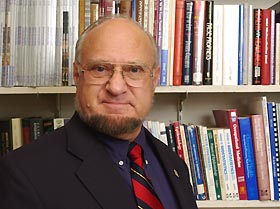|
This is an archived article.
For the latest news, go to the Advance
Homepage
For more archives, go to the Advance Archive/Search Page. |
||
|
Hansen Led Public Health Program
Through Era Of Change By Pat Keefe Dr. Holger Hansen had a mission when he signed on as a faculty member at the Health Center in 1979. When he retired 23 years later, the mission was not only complete but successful. That mission was to reorient the advanced degree sponsored by the Department of Community Medicine. The reorientation worked. When Hansen retired at the end of December, the education program had more than 200 enrollees - making it the Health Center's second largest behind the School of Medicine.
"Public Health is always close to my heart," he says. "I believe in it professionally and philosophically." When Hansen came to Farmington, the Department of Community Medicine had evolved from the original Department of Medicine and Society. The advanced degree program it offered at the time was a master's in Community Health Science. The focus was on physicians, and the training was oriented to primary care in the community. Although it was a groundbreaking offering in terms of the institution - it was taught collaboratively by faculty from Storrs and the Health Center, and was the first Farmington program to be so taught - it wasn't particularly well received by either community doctors or people working in public health. Hansen believed the program's lukewarm reception was because the community physicians who might have been interested in it were already providing clinical services in the community. And the physician orientation was inappropriate for public health professionals, who might have an interest in an advanced degree but only if it addressed public health problems. Dissatisfied with the situation, the Health Center recruited Hansen from Columbia University, where he had received his master's in public health and a doctorate in epidemiology, and was then a faculty member with duties including helping to reshape the doctoral program of Columbia's School of Public Health. "After the noise and stress of the years in New York City, the green hills of Connecticut were very attractive," he says. So was the challenge of working with the master's program. By 1984, five years after he arrived, Hansen sought national accreditation for the program and received certification from the Council on Education in Public Health. The Board of Higher Education authorized the University to offer the master's of public health degree. The program was unusual at the time, in that it enabled working professionals to pursue comprehensive MPH studies, Hansen says. Additionally, just what the program meant to the state could be seen in the large number of applications. That demand was particularly acute in the southeastern and southwestern portions of the state, where Groton-based Pfizer offered the potential of an enthusiastic following, as did the burgeoning and wealthy communities offering public health services on Connecticut' s "Gold Coast". Accordingly, MPH programs were set up at Avery Point and the Stamford campus, where they remain well-attended and busy. Hansen has come a long way from the East German physician who fled and finished his medical degree work in West Berlin, and from the immigrant resident surgeon who took up public health in New York in the late 1960s to get on with a career instead of spending a half-dozen more years in U.S. surgical internships and residencies. Along the way, he served as chairman of the Department of Community Medicine on an interim basis for more than four years; was an academic advisor to universities in Portugal, Jamaica, and Grenada; has been a research advisor at universities in Pakistan, Bangladesh, Kenya, Russia, and Germany; and a visiting professor at universities in Brazil, Sri Lanka, and Germany. He is a fellow and governing board member of several public health associations and has been cited by the Connecticut Public Health Association, as well as receiving the Special Recognition Award last year from the national Association of Teachers of Preventive Medicine. Upon his retirement, the Graduate Program Committee of the Health Center named the MPH fellowship in honor of him, and the Connecticut General Assembly cited him for his leadership of UConn's public health program. His varied experiences have helped make him a committed partisan of the utility of advanced education in public health. And as such a partisan, he harbors a dream: the establishment of a University of Connecticut graduate school of public health. "The master's of public health program is a milepost along the road," he says. "It is the cornerstone upon which a school can be built. The baby has not been born, but it has been conceived." |

